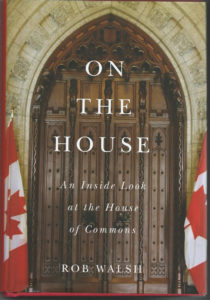On the House: An Inside Look at the House of Commons

Rob Walsh, notes by John Cockburn
Sandy Hill resident Rob Walsh was Law Clerk and Parliamentary Counsel of the House of Commons from 1999 to 2012. His new book On The House was launched on Nov. 6, the 150th anniversary of the first sitting of Canada’s Parliament. The following comments by Mr. Walsh were made during a conversation with IMAGE’s John Cockburn.
The book is about the House of Commons as a public institution. I was surprised, for the most part pleasantly, by what I learned in my years there; readers may be surprised as well. It is neither a political exposé nor a personal memoir; if it were, the focus would not be on the institution and the House wouldn’t be explained.
I thought the organization and functions of the House would be of interest to Canadians who may have only seen the House as tourists, if that. It is written as a presentation to a newly elected Member of Parliament—a surrogate for anyone who has never spent time inside the House of Commons.
The book takes the reader through the House’s political beginnings and political evolution in England before coming to Canada as the second chamber in our parliamentary system of government. It considers powers and privileges, constitutional functions and internal administration, with a few thoughts on how it could do better.
My involvement in many of the high-profile issues between 1999 and 2012 arose unexpectedly. As Law Clerk and Parliamentary Counsel I was responsible for advising members and House committees, the Speaker and the Clerk on the legal, especially constitutional, aspects of the issues touching powers and privileges of the House or a committee.
The minority parliaments from 2004 to 2011 showed more fully the House’s constitutional function of holding the Government to account as the Government had less control of proceedings; the opposition parties had the majority. This led committees or individual members on committees to call upon me for legal advice.
My involvement with major political controversies began with the sponsorship inquiry (into management of a program to boost the federal government’s profile in Quebec) before the Gomery Commission took over. Then there were abuse of office charges against Privacy Commissioner Radwanski, (he eventually resigned hours before the House was going to cite him for contempt), and soon after, issues pertaining to the committee testimony of senior RCMP officers relating to the RCMP’s pension and insurance plans (which resulted in a Deputy Commissioner being found to have misled the committee and being cited by the House for contempt). There was the Airbus affair involving allegations that Karlheinz Schreiber had arranged for secret commissions for former Prime Minister Brian Mulroney on the purchase of Airbus airplanes. A critical issue was to prevent or delay the deportation of Mr. Schreiber to Germany before the committee had heard his testimony.
While there were a variety of challenges to the privileges of the House on which I was asked to advise, a particularly difficult case was the encroachments upon parliamentary privilege by the Government’s Federal Accountability Act in 2006, (as a result many of the offensive provisions were either removed or amended). Then there was the Afghan detainee controversy and finally, the Finance Committee sought information from the Government on the cost of its justice bills and the proposed purchase of F-35 jets (which eventually led to a non-confidence vote and the election of 2011).
In the book’s epilogue, I suggest a few changes that I think might serve to redress the imbalance between the Government side and the opposition side, especially when the Government has a majority. For example, I suggest opposition days in committees and debateable motions on prorogation before the Government discontinues a parliamentary session. There are a few other changes suggested, but I acknowledge that no rebalancing in favour of the opposition will ever happen so long as the Government of the day is unwilling to give up any of its powers, which is most of the time.
Advice to budding authors
This the first time I have written a book. Keeping my reader in mind was important so the writing stayed focused. I wrote much more than was published. One has to be ready to leave out material that might seem relevant and interesting but burdens the reader unduly.
Finding a publisher who shares your vision is critical. I was in discussion with a publisher who wanted accounts involving recognizable names, more like a political insider’s account. I then went to McGill-Queen’s University Press, a publisher of thoughtful Canadian content, praying that it would find my manuscript of interest as there were very few books on the House that weren’t memoirs or textbooks.
 Where to find it
Where to find it
On the House may be ordered from McGill-Queen’s University Press at www.mqup.ca or through a local bookstore. Jim or Michael at Perfect Books at 258A Elgin Street have copies for sale: 613-231-6468; info@perfectbooks.ca; www.perfectbooks.ca.